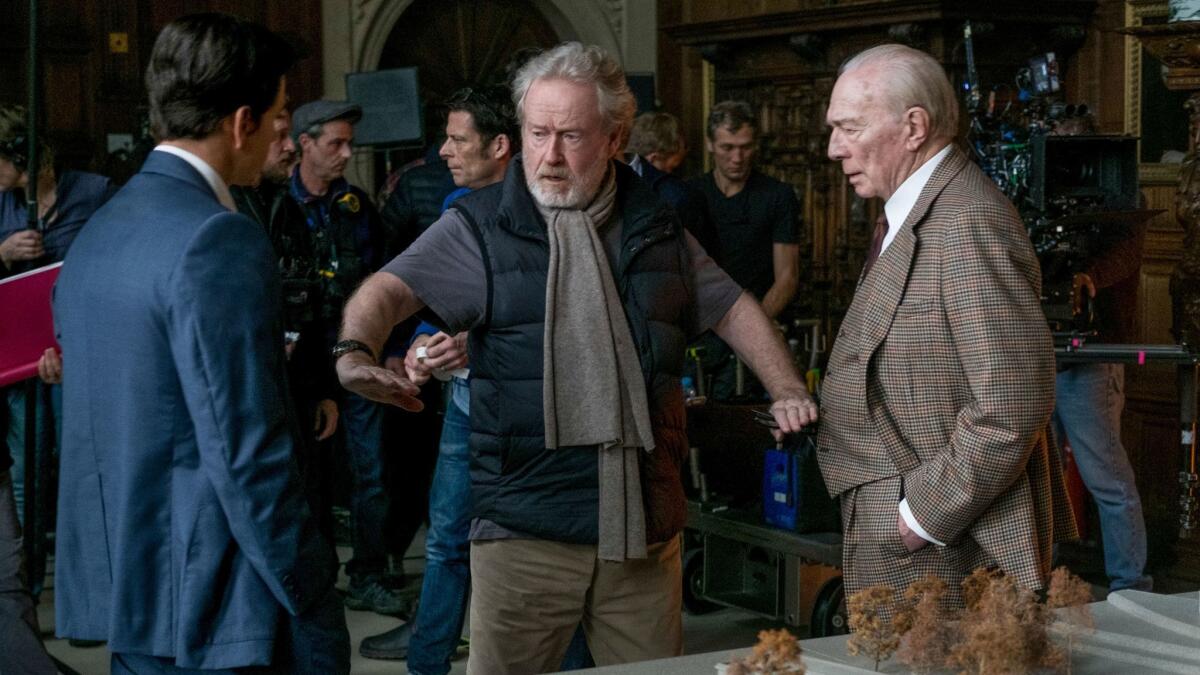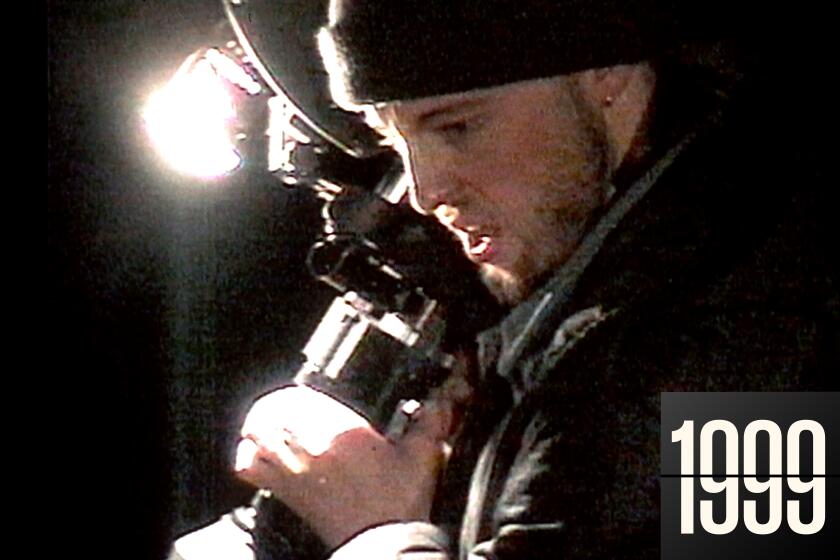Ridley Scott’s ‘All the Money in the World’ and Steven Spielberg’s ‘The Post’ offer a revealing study in directorial contrasts
It’s not exactly rare for Steven Spielberg and Ridley Scott, two of the most respected and industrious directors in Hollywood, to have new movies in theaters simultaneously. (It happened before in 2015 with “Bridge of Spies” and “The Martian.”) Still, there was nothing ordinary about the circumstances that brought us the late-breaking December duo of Spielberg’s “The Post” and Scott’s “All the Money in the World,” two unusually gripping ticking-clock thrillers that found these veteran filmmakers working on tight deadlines of their own.
So accelerated were their production schedules that not until spring could anyone have even anticipated the existence of these movies, which were shot, edited and completed within months. Nor could anyone have foreseen the difficult circumstances that shaped their creation, making them unexpectedly revealing documents of not just the early-’70s scandals and power plays against which they unfold, but also the equally fraught times in which we live.
In the case of “The Post,” at least, that timeliness was largely premeditated. Initiated in February, after the inauguration of Donald Trump and during a post-production lull on Spielberg’s upcoming “Ready Player One,” the movie offers a brisk and energetic jaunt through the Washington Post newsroom circa 1971, during the much-contested publication of excerpts from the Pentagon Papers, first in the New York Times and then in the Post. It’s a rousing defense of 1st Amendment freedoms that opens a window into the embattled soul of present-day American journalism itself, now under fire from an even more openly hostile presidential administration than Richard Nixon’s.
The Trump-era subtext is both subtler and more corrosive in “All the Money in the World,” a tough, unsparing portrait of the late billionaire J. Paul Getty in the wake of his teenage grandson’s 1973 kidnapping. Whatever the film might have to say about a culture of unchecked greed has been temporarily eclipsed, along with some of its other virtues, by Scott’s extraordinary 11th-hour decision to recast Christopher Plummer as Getty, replacing Kevin Spacey and salvaging the film from a toxic association with the sexual-abuse accusations sweeping the industry.
The speed with which these pictures came together — to say nothing of the quality of the finished products — has defied the conventional industry expectations for directors of a certain age. (Scott just turned 80; Spielberg is 71.) And it has garnered considerable praise and even newfound respect for two Hollywood pros who, for all the accolades and box-office dollars they’ve amassed, have sometimes been in danger of going underappreciated.

Which is not to suggest that “The Post” and “All the Money in the World” are equivalent or even similar achievements. One picture was directly shaped in response to current events; the other was sideswiped by them. Spielberg’s film implicitly rebukes the Trump administration and its relentless assaults on the news media; Scott’s movie represents a startling feat of damage control in post-Harvey Weinstein Hollywood.
The surreal ugliness of contemporary politics and the widespread mistreatment and subjugation of women are, of course, grimly interlocking American realities. And it’s only fitting that they have been held in check this year by a vital counter-narrative of female resistance and empowerment — one to which “The Post” and “All the Money in the World” themselves offer important contributions.
Review: Steven Spielberg’s ‘The Post’ is a movie about the past that speaks to our times »
For those who agreed with the actress-filmmaker Elizabeth Banks when she took Spielberg to task for his apparent lack of interest in female protagonists, “The Post” — which went into production a few months before Banks made those controversial public remarks — offers a late but welcome corrective. In pitting the Washington Post’s storied publisher Katharine Graham against a bevy of professional mansplainers, the film wrings uplift and pathos from a female trailblazer’s personal history and grants Meryl Streep one of the richest roles of her storied career.
Scott’s feminist credentials, meanwhile, have never been in doubt: He will always be the director we have to thank for Thelma and Louise, to say nothing of Ripley. And while Plummer’s seamlessly integrated performance is rightly dominating “All the Money in the World’s” headlines, it’s worth noting that the movie boasts a singularly memorable female lead in Getty’s ex-daughter-in-law, Gail Harris, played by Michelle Williams as a fierce avatar of maternal resolve.
In one telling scene, Harris makes her way, poker-faced, through a sea of reporters, quietly defying one paparazzo’s demand that she shed a tear for the cameras. The character’s lack of self-pity is reflected in Scott’s own implacable gaze, in the ruthless refusal of sentimentalism that has become his authorial signature. And it stands, of course, in marked contrast to Spielberg’s instinctively warm and emotional approach in “The Post”: He bathes Streep’s Graham in a softly enraptured glow and plays up her difficult backstory, balancing her demonstrations of clear-eyed leadership with moments of hesitation and self-doubt.
I’m not drawing a qualitative difference so much as pinpointing a disparity in artistic temperament — one that accounts, I think, for the difference in popularity between these two popular filmmakers. Spielberg and Scott have, of course, colonized much of the same genre territory over the years — historical epics, war movies, science-fiction thrillers — and have minted some of Hollywood’s most enduring franchises along the way.
But there is a reason why Spielberg, the consummate entertainer behind such seminal blockbusters as “Jaws,” “E.T.” and “Jurassic Park,” has enjoyed nearly unparalleled commercial success, while Scott’s box-office highs (“The Martian,” “Gladiator”) have been more respectable than stratospheric. In the year that gave us “Blade Runner 2049,” it’s worth recalling that the original “Blade Runner,” perhaps Scott’s richest, most influential movie, was a flop on its initial 1982 release — a gorgeous work of art that offered audiences no shortage of mood and mystery but little in the way of emotional or narrative hooks.
‘The Post’ rebukes the Trump administration and its assaults on the media; ‘Money’ represents a startling feat of damage control in post-Weinstein Hollywood.
— Justin Chang
If it’s reductive to characterize Spielberg as a warm filmmaker and Scott as a cold one, it may be more useful to suggest that one director has always felt like an anomaly of the system rather than a product of it. In terms of prestige — an ersatz but much-coveted currency distributed annually by the Academy of Motion Picture Arts and Sciences — it may explain why Spielberg has won two directing Oscars, while Scott, despite a trio of nominations in that category, has never made it to the winner’s circle.
That could change, of course, if academy voters respond strongly enough to “All the Money in the World,” and I suspect that some might be inclined to award Scott points for sheer chutzpah alone. His daring and entirely successful last-minute tinkering feels like both an unprecedented leap and a glorious throwback to the days of Old Hollywood risk-taking.
More than anything, perhaps, it feels like a masterstroke worthy of his cold and calculating movie, already a celebration of ruthless pragmatism and diabolical ingenuity under pressure. It’s the work of a filmmaker who, as his wickedly unguarded interviews have made clear, has long stopped caring what other people think and has no intention of letting anyone, least of all one of his own collaborators, stand in his way.
For all their differences in sensibility, both Spielberg and Scott have often been criticized as overly “mechanical” filmmakers, so skilled at generating effects (visual as well as emotional) that their stories have become rote, predictable, ineffective. Spielberg is routinely derided as a button-pushing sentimentalist, a purveyor of rank emotional manipulation. Scott has often struck his critics as a soulless technician, someone who revels in elaborate world building and lavish spectacle at the expense of story and character.
If they accomplish nothing else, the tense dramatic stakes and undeniable human pulse of “The Post” and “All the Money in the World” may well give the lie to those easy dismissals. You could call these movies mechanical, I suppose, though it’s worth remembering that a piece of machinery, when carefully oiled and scrupulously maintained, can produce the most wondrous things. And not unlike the old-fashioned printing presses we see operating in “The Post,” a filmmaker’s machinery is capable of stamping even the most seemingly impersonal product with its own recognizable signature.
Along with “Lincoln” (2012) and “Bridge of Spies” (2015), “The Post” completes an unofficial Spielberg trilogy of historical dramas that position America at a moral crossroads: These are movies about the backroom tactics and negotiations by which the very soul of a republic survives. The films’ emotional restraint and rigorous, process-driven storytelling have led some to note the emergence of a more mature, grown-up Spielberg, albeit one who clings to an uncynical belief in human decency.
I’m stirred by Spielberg’s optimism, though if I’m honest, it’s Scott’s unsparing, unlovable pessimism that excites me more. He can be a maddeningly erratic filmmaker, but even the least of his recent efforts have felt like the products of a challenging, fully realized vision — one that takes an increasingly dim, dispassionate view of humanity and dares to ask if the universe might have any more worthwhile species on offer.
It’s this vision that gave such diamond-hard brilliance to Scott’s “The Counselor” (2013), a vicious, nihilistic crime picture that few saw and even fewer liked. It’s this vision too that inflected 2014’s “Exodus: Gods and Kings” with its uniquely critical spirit: Here was a biblical epic unafraid to re-imagine God as a petulant child, with an entire race fashioned in his inglorious image.
And if this year’s “Alien: Covenant” was fairly second-rate as a horror movie, it was eerily remarkable as a dispatch from a post-human future, no more encouraging us to identify with its astronaut characters than with the androids and aliens who would ultimately prove their undoing.
“All the Money in the World” is a superficially gentler, more human-scaled picture. Like “The Post,” it’s ultimately an underdog story in which a few principled truth seekers go head-to-head with a rotten, well-moneyed system. Against such powerful forces, what chance does hope have of surviving?
“The Post,” calculating its answer for maximum uplift and zeitgeist resonance, leaves us pondering the heights of integrity and moral responsibility to which we could still rise. “All the Money in the World,” more bent on entertaining than edifying us, lays bare the depths of greed, self-interest and callous indifference to which we have already sunk. Neither picture is going to win prizes for historical accuracy, but I know which one feels closer to the truth.
ALSO
‘Call Me by Your Name,’ ‘The Florida Project’ lead Justin Chang’s 12 best films of 2017
What’s the state of this year’s wide-open Oscar race? Let’s examine further.
More to Read
Only good movies
Get the Indie Focus newsletter, Mark Olsen's weekly guide to the world of cinema.
You may occasionally receive promotional content from the Los Angeles Times.











